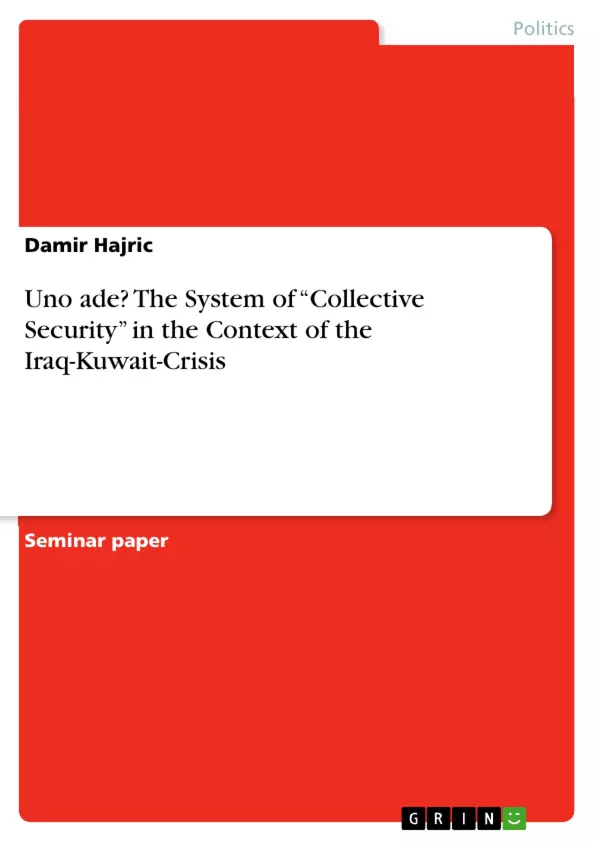Due to the Iraqi aggression against Kuwait, Chapter VII of the UN-Charter has
served for the Security Council to legalize military intervention against Iraq.13 In this
connection, it is relevant to deal with Chapter VII as the only element within the
Charter which authorizes the Security Council to make use of military force in case it
characterizes a crisis as a threat for international peace or as a breach of peace. There
from, scopes of action to protect international peace and security, but also possible
barriers will be interpreted.
Based on these theoretical fundamentals, the second part intends to give an empirical
analysis in which it should be proven to what extent the Iraq-Kuwait crisis can be
regarded as a renaissance of usage of force and in to what extent it can be really regarded
as an example of outstanding cooperation between the members of Security
Council. It would go beyond the scope of this paper to analyse every Resolution
which passed by the Security Council before Resolution 678 was accepted and there
is no interest in going into details about military action on the field.14 First of all it is
relevant to give a short differentiation between Chapter VI and Chapter VII, because
each of them suggests other strategies on how to treat a conflict.
[...]
Inhaltsverzeichnis (Table of Contents)
- INTRODUCTION
- THE SYSTEM OF COLLECTIVE SECURITY: A THEORETICAL OVERVIEW
- Differentiation between Chapter VI and Chapter VII of the UN-Charter and the position of Security Councils within the system of collective security
- Chapter I, Article 2: The prohibition of the use of force
- Conflict management according to Chapter VII
- UN: FIG LEAF OR A MOTOR? THE IRAQ-KUWAIT CRISIS
- Ignoring the Charter of the United Nations
- A dark chapter in the history of the United Nations: US-“Mafia”Diplomacy
- Resolution 678
- CONCLUSION
Zielsetzung und Themenschwerpunkte (Objectives and Key Themes)
This paper provides a critical analysis of the conflict settlement instruments established in the UN Charter, particularly those manifested in Chapter VII, examining how they were disavowed and misused by the power-political aims of certain states in the context of the Iraq-Kuwait crisis. The focus is on the role of collective security mechanisms in the face of national interests and the impact of the US-led military intervention on the principles of multilateral conflict management.
- The application and effectiveness of the UN's system of collective security.
- The interplay between national interests and international cooperation in conflict resolution.
- The role of Chapter VII of the UN Charter in authorizing the use of military force.
- The impact of the Iraq-Kuwait crisis on the UN's ability to act as a peace-promoting organization.
- The limitations and challenges of multilateral conflict management in the face of superpower influence.
Zusammenfassung der Kapitel (Chapter Summaries)
- Introduction: The paper examines the evolution of the United Nations' role in international peace and security, particularly in light of the end of the Cold War. It highlights the potential for the UN to develop from a peace-promoting organization to one capable of active intervention. The Iraq-Kuwait crisis is presented as a critical case study for analyzing the effectiveness of the UN's system of collective security.
- The System of Collective Security: A Theoretical Overview: This section delves into the theoretical framework of the UN's system of collective security, particularly focusing on Chapters VI and VII of the UN Charter. It explores the different approaches to conflict resolution outlined in these chapters and the role of the Security Council in implementing them.
- UN: Fig Leaf or a Motor?: The Iraq-Kuwait Crisis: This section analyzes the Iraq-Kuwait crisis as a practical test of the UN's system of collective security. It examines how the crisis challenged the theoretical framework and raises questions about the influence of national interests on multilateral conflict management. The section investigates the role of US-led intervention and its implications for the principles of collective security.
Schlüsselwörter (Keywords)
This study focuses on the United Nations' system of collective security, particularly in the context of the Iraq-Kuwait crisis. Key themes include Chapter VII of the UN Charter, military intervention, national interests, superpower influence, multilateral conflict management, and the limitations of the UN's capacity to act as a peace-promoting organization.
- Quote paper
- Bachelor Damir Hajric (Author), 2008, Uno ade? The System of “Collective Security” in the Context of the Iraq-Kuwait-Crisis, Munich, GRIN Verlag, https://www.grin.com/document/113018



